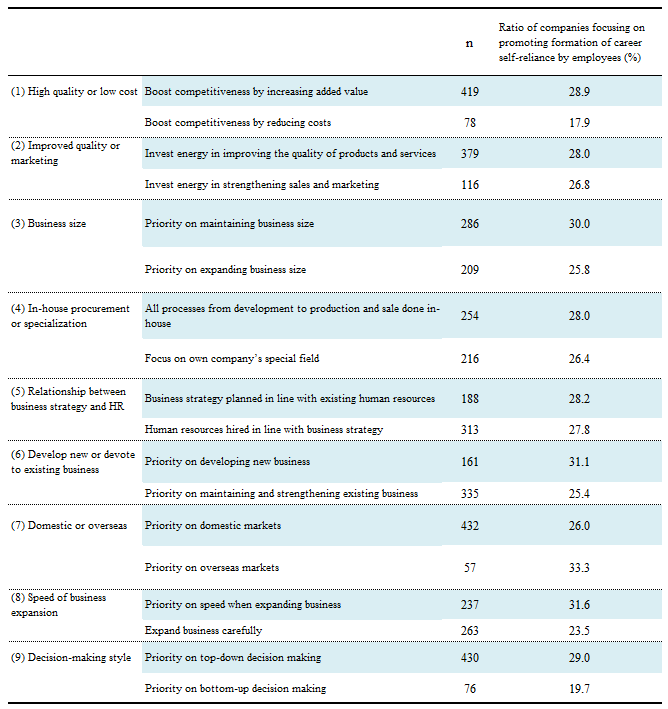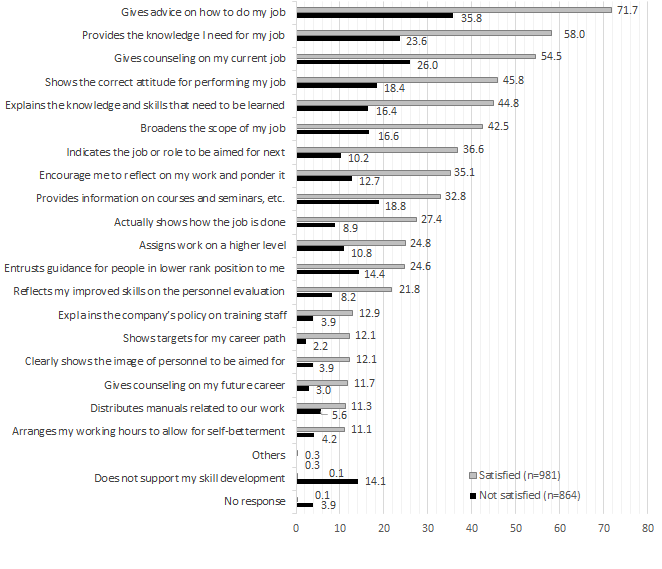JILPT Research Report No.196
Human Resources Development and Career Management in Japanese Companies
March 31, 2017
Summary
Research Objective
While changes in the social environment such as low economic growth, birth rate decline and population aging are making it harder for corporate organizations to expand, there are social demands for employment to continue after 65 or older and women’s career opportunities to be increased. Due to these, and the need to further advance the globalization of economic activity, many Japanese companies seem to be exploring various initiatives on ways of assisting their employees’ career formation and skill development. Keeping this present situation in mind, the purpose of this research was to ascertain and analyze facts concerning initiatives being pursued by companies with regard to their employees’ human resources development and career management, and how those initiatives relate to the nature of corporate management and the direction of human resources management in general. Additionally, the environment surrounding human resources development and career formation by workers (employees) was examined by ascertaining the realities of workplaces based on companies’ initiatives and managerial activities.
Research Method
A questionnaire survey was carried out among companies with 300 or more employees consisting of the management personnel and regular employees who work for them (January to March 2016), and the results were analyzed.
Main Findings
- The ratio of companies that are “currently investing energy” on efforts for multi-track career management is about three times as large in companies that prioritize overseas markets as those that prioritize domestic markets. In companies that prioritize overseas markets and pursue their business overseas, it can be surmised that moves to manage the human resources development and career formation of management personnel and candidates for management posts, as opposed to other employees, may be taking place because the qualities and skills demanded for management posts have become more advanced. This in turn must be due to the need for local project management in overseas businesses and overall management of projects developed globally.
The tendency to make efforts to promote formation of career self-reliance by employees is stronger in companies that are attempting to boost their competitiveness by increasing their added value, trying to develop their business quickly, or prioritizing on top-down decision making (Table 1). Those that aim to boost competitiveness by increasing their added value place priority on human resources as a source of higher added value. Their supposed intention in encouraging formation of career self-reliance is to encourage employees to pursue skill development and improve their skills voluntarily. Meanwhile, companies that focus on speed when developing their business seem to increase the speed of securing the human resources they need until it matches the speed of business development. They do so by encouraging formation of career self-reliance by their employees.
Table 1. Management policies and efforts to encourage career self-reliance by employees

- Evaluation by HR divisions is polarized on collaboration between HR divisions and line managers in connection with skill development. When a company’s evaluation is that “There is no collaboration,” its perceived tasks are more likely to be to provide management personnel with knowledge and knowhow on skill development, to foster and motivate interest in skill development, and to promote skill development linked to whole-company needs. On the other hand, when the evaluation is that “There is collaboration,” a large proportion of these companies are engaged in initiatives such as “creating and circulating the company’s policy on training and skill development,” “coordinating awareness on the image of required human resources,” “providing information on seminars and training courses” and “holding management courses on how to train subordinates.”
Evaluations by management personnel are also divided on collaboration with HR divisions in connection with skill development. Managers who say that “There is collaboration” perceive that HR divisions are engaged in wide-ranging efforts related to support for skill development, and tend to place a high evaluation on the current situation of skill development by subordinates.
- According to the Manager Survey, the ratio of managers who think that support is available for training and skill development of subordinates is 32.9%. In other words, many managers perceive that support is not sufficiently available to subordinates for skill development. Managers who feel that they do not give enough support engage in less actions such as “indicating the job or role to be aimed for next” or “explaining the knowledge or skill that need to be learned” than those who do provide such support. Those managers tend to have a stronger perception of problems in the lack of time for training and the lack of knowledge or knowhow for training.
Of the employees working for managers, about half responded that they were satisfied with the support from their manager for training and skill development. Between those employees who were satisfied and those who were not, there was a large gap in awareness on the content of support for skill development received from the manager. Under “gives advice on how to do my job,” for example, the response rate from subordinates who were not satisfied was 35.8%, while the response rate for “provides the knowledge I need for my job” was 23.6%. Both of these were about 35 percentage points lower than the rates for subordinates who were satisfied (Figure 1).
Figure 1. Analysis by level of satisfaction with guidance and support from supervisors: Content of skill development support received from supervisors by subordinates (multiple responses)

- White-collar occupations in companies may be classified as “clerical occupations,” “sales and marketing occupations” and “planning and development occupations,” based on the job content. In clerical occupations, off-the-job training such as acquiring specialist knowledge on a job provides useful opportunities for skill development. Guidance and advice from a supervisor are also thought to be useful in improving skills. In sales and marketing occupations, “experiencing work outside one’s own assignment, such as supporting others” also provides useful opportunities for skill development besides off-the-job training. In that sense, there is no sign of a correlation between longer working hours and any obstruction to skill development.
In “planning, and R&D occupations,” attending off-the-job training instructed by the company alone is not enough to constitute skill development. This must be due to the nature of these occupations, in that the job content often changes as it demands specialist knowledge and new ideas. To improve skills, employees are expected to act positively by themselves outside working hours, such as by learning from books or manuals or obtaining information from friends outside the company. On this point, skill development will proceed more smoothly if the supervisor gives consideration to this when allocating working hours.
Policy Implications
The following policy implications are expected to be obtained from the results of analysis in this research.
- There is a need to devise policy support measures for enhancing the roles of workplace managers in training and skill development, and strengthening collaboration between managers and their companies (HR divisions). Specifically, conceivable methods could include financial and human support for education and training course programs aimed at managers involved in training and skill development, and support for developing systems implemented by companies with the aim of gathering and evaluating information on training and skill development in the workplace (e.g. provision of knowhow, financial support for trial program implementation).
- Though managers themselves want to allocate more time to training their subordinates and developing their skills, this has not been achieved in a current situation. Better use should therefore be made of “career counselor”* who could effectively support managers. Conceivable policy support measures to this end could include (i) developing and implementing training programs to increase the number of in-house career counselors, and (ii) gathering, analyzing and disseminating cases of good practice related to collaboration between in-house career counselors and managers.
- The importance of skill development that enables working people to improve their various levels of expertise is increasing in the years to come. When promoting this trend, an environment where working people can voluntarily tackle their own skill development needs to be created. Therefore, in order to make it easier for companies to generate this work environment and to ensure that systems and others in the workplace are deployed more actively, various working time measures targeting skill development (exemption from overtime work, sabbatical leave for skill development, etc.) and the coercion of implementing those measures are required.
* Here the term “career counselor” is used as a general term for a person providing career consulting, vocational counseling, and other forms of vocational and career support for individuals including career development assistance.
Policy Contribution
As well as providing information on the current status of human resources development in Japanese companies, this research raises issues that requires attention when planning and implementing human resources development support policies. It will also contribute to the establishment and effective management of policies.
Main Text (only available in Japanese)
- JILPT Research Report No.196 Whole text (PDF: 1.9MB)
If it takes too long to download the whole text, please access each file separately.
- Cover – Preface – Authors – Contents (PDF: 412KB)
- Part I: Introduction (PDF: 487KB)
- Part II: Analysis of human resources development and career management by Japanese companies, and skill development of employees (PDF: 1.2MB)
- Part III: Reference material – “Questionnaire Survey on In-House Training, Skill Development, and Career Management” (Company Survey, Manager Survey, and Employee Survey) (PDF: 1.2MB)
Research Categories
Project Research: “Research on vocational skill development systems in response to economic and social change”
Subtheme: “Research on directions for skill development and career formation in companies”
Research Period
April 2012 - March 2017
Authors
- Makoto FUJIMOTO
- Senior Researcher, Department of Career Development, JILPT
- Yoshihide SANO
- Professor, Faculty of Business Administration, Hosei University
- Rui YAMAGUCHI
- Research Assistant, JILPT
(Ph.D. Student at Graduate School of Sociology, Hosei University) - Tomohiro TAKAMI
- Researcher, Department of Labour and Economy, JILPT
Catergory
Human resources management / Vocational skills development
Related Research
- Labor Policy Report No.11, “Skill development and career formation in Japanese companies: Survey of an existing research and a pilot analysis” (2014)
JILPT Research Report at a Glance
| To view PDF files, you will need Adobe Acrobat Reader Software installed on your computer.The Adobe Acrobat Reader can be downloaded from this banner. |

